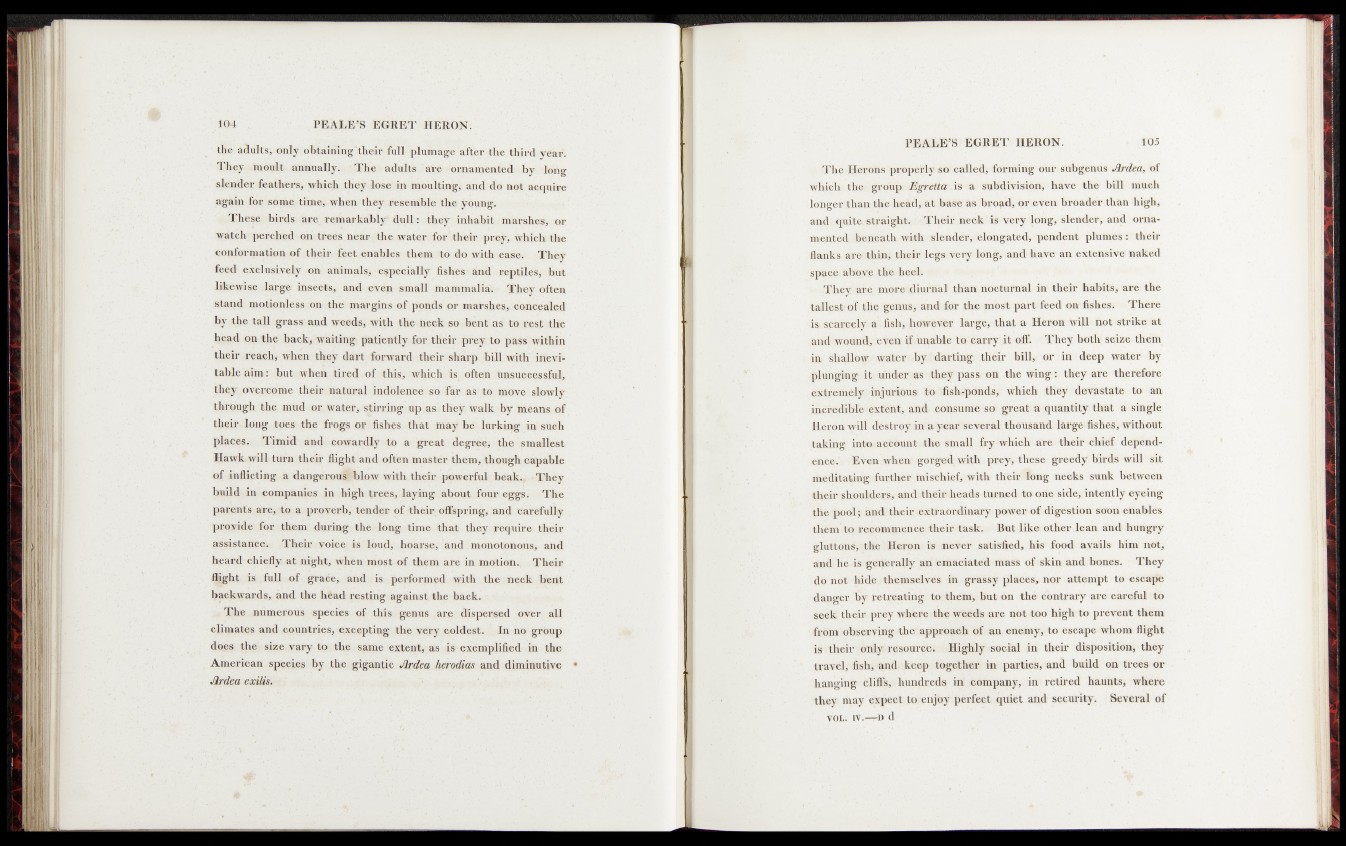
the adults;. only obtaining'their fall plumage after the third year.
They .moult annually. The adults are ornamented by long
, slender feathers, which they lose' in moulting, and do not acquire
again for some time, when they” resemble the young.
These birdt arA remartaWy* t h ^ . inhabit marshes, ©r
watch perched dn trees near the water for -their prey, which the
conformation of their feet enables- them to do with ease. They
feed- ekelusiveiy oh- animals, especially fishes and reptiles, but
likewise large inserts, and even small mammalia.- They often
stand motionless on the margins of ponds or marshes, concealed
by the tall grass' and weeds, with the neek so bent as to res;t the
head on the back,.waiting patiently fox* their prey to pass within
their reach, when they dart forward their sharp bill with iheyi-
table aim: but when tired of this, which is often Unsuccessful,
they overcome their natural indolence so far as to move slowly %
through the mud or. water, stirring .up a s . they walk by means of
their long toes th# frogs Or fishes that may be lurking in such
places.- Timid and cowardly to a great degree; the smallest
Hawkrwill turn their flight and often master them, though capable
of inflicting a dangerou^Sblow with their powerful beak^ •They,
build in companies in high trees, laying about four eggs. The
parents are, to a proverb, tender of their offspring, and carefully
provide for them during the long time that they Require their
assistance^: Their voice is loud, hoarse, and monotonous, and
heard chiefly at night, when most of them are in motion., Their
flight is full of grace, and is performed with the neck bent
backwards, aiiid the hSad resting against the back.
The numerous species of this genus a re dispersed over all
climates and countries, excepting the very coldest. In no group
does the size vary to the same extent, as is exemplified in .the
American species by the gigantic Jlrdea herodias and diminutive
Jlrdea epcilis.
■' The :Heroas pmperly so eailed, fcrming oursubgetius Jlrdea, of
which the group: Egretia .is - a subdivision, have the hill much
longer than the head, at -bas» ks broad, omven broader than high,
an-d-iiiqi^e/MtCaifh#,,v Their neck'* is-veryfeng, slender, and ornamented
beneath with slender,Aëhmgatedj 'fto-pdiei&t- plumes i
flariks A^Aeg^;v&i^lénfflv and%a^e an extensive naked
space above the heck
They inr© more diurnal than nocturnal in their habits, #r* the
tall©### the genus, and for the most part &#i ®n fishes. There
is scareely1 a fish, however large, -that a Heron Will hot »trike at
and: wound, even if unable to carry it off. v®h!6f both seize them,
in shallow water b y . darting- their billy or in i© e p water by
plunging it under as they pass- on the wing: they are therefore
extremely injurious to fish-ponds, which they devastate to an
incredible extent, and consume, so great a quantity that a single
Heron will destroy in a year several thousand large fishes, without
taking into, account the stoall fry which are their chief depend-
•ejaee.' Even when- gorged with prey, thus»greedy birds will sit
meditating further mischief, with theiirfong necks sunk between
their shotdders, and theiurfeeads turned inod© side, intently eyeing
the pool; and their • extraordinary power of digestion sot>n enables
them’to recommence their task. But like other lean and hungry
gluttons, the Heron is never satisfied, his food avails him not,
and he is generally an emaciated mass of skin and bones. , They
do not hide themselves in grassy places, nor attempt to escape
danger by retreating to them, hut on thé contrary are careful to
seek their prey where the weeds are not too high to prevent them
from observing the approach of an enemy, to escape whom flight
is their only resource. Highly social in their disposition, they
travel, fish, and keep together in parties, and build on trees or
hanging clifife,. hundreds in company, in retired haunts, where
they may expect to enjiby perfect quiet and security. , Several of
vol: it.-r -D d .